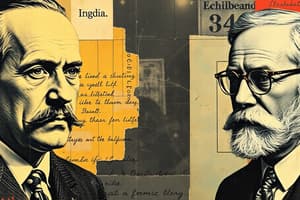Podcast
Questions and Answers
What does the study of history incorporate?
What does the study of history incorporate?
- Geography, literature, aesthetics, sociology, economics, and political science (correct)
- The future predictions of societies
- Only political science
- Only economics and sociology
The study of history focuses only on the experiences of a single gender.
The study of history focuses only on the experiences of a single gender.
False (B)
What is the meaning of the term 'historiography'?
What is the meaning of the term 'historiography'?
The study of the writing of history and different interpretations of historical events.
The term 'historia' in the etymology of history denotes _____ and inquiry.
The term 'historia' in the etymology of history denotes _____ and inquiry.
Match the following terms with their definitions:
Match the following terms with their definitions:
What perspective does Herstory aim to provide in history?
What perspective does Herstory aim to provide in history?
Cyclical views of history suggest that events occur in a linear fashion.
Cyclical views of history suggest that events occur in a linear fashion.
Who envisioned four great ages of man culminating in the scientific enlightenment?
Who envisioned four great ages of man culminating in the scientific enlightenment?
Augustine of Hippo believed that history was the unfolding of the plan of _______.
Augustine of Hippo believed that history was the unfolding of the plan of _______.
Match the following historical perspectives with their descriptions:
Match the following historical perspectives with their descriptions:
Which concept suggests that history is driven by human ideas?
Which concept suggests that history is driven by human ideas?
Marxist historians believe that history is a sequence of class struggles that always leads to peace.
Marxist historians believe that history is a sequence of class struggles that always leads to peace.
According to the Greeks, who did they regard themselves better than?
According to the Greeks, who did they regard themselves better than?
Who is considered the foremost proponent of the economic view in history?
Who is considered the foremost proponent of the economic view in history?
According to the economic view, ideas are the primary drivers of historical progress.
According to the economic view, ideas are the primary drivers of historical progress.
What does gender history focus on?
What does gender history focus on?
Historical revisionism is often associated with the use of propaganda by those who hold _____ in society.
Historical revisionism is often associated with the use of propaganda by those who hold _____ in society.
What does Michel Foucault suggest about the victors of social struggles?
What does Michel Foucault suggest about the victors of social struggles?
According to the economic view, the production and exchange of goods and services are the basis of all _____ structures.
According to the economic view, the production and exchange of goods and services are the basis of all _____ structures.
Match the following historical perspectives with their descriptions:
Match the following historical perspectives with their descriptions:
What factors are mentioned as determinants in history aside from economic factors?
What factors are mentioned as determinants in history aside from economic factors?
What does the provenance of a document help to establish?
What does the provenance of a document help to establish?
Historians should only rely on a single witness to verify events.
Historians should only rely on a single witness to verify events.
What is one method historians use to establish the credibility of an author?
What is one method historians use to establish the credibility of an author?
The ability of a source to tell the truth is one aspect historians examine concerning the ________ of the eyewitness.
The ability of a source to tell the truth is one aspect historians examine concerning the ________ of the eyewitness.
Match the following terms with their meanings:
Match the following terms with their meanings:
Which of the following is NOT considered a test of authenticity?
Which of the following is NOT considered a test of authenticity?
A historian can trust a witness based solely on their personal attitude.
A historian can trust a witness based solely on their personal attitude.
Provide an example of a primary source that could be tested for authenticity.
Provide an example of a primary source that could be tested for authenticity.
What is the first step in analyzing a primary source according to the content?
What is the first step in analyzing a primary source according to the content?
Bias can only be strongly positive.
Bias can only be strongly positive.
What does the term 'historical empathy' refer to?
What does the term 'historical empathy' refer to?
To determine historical context, one should look at when the source was made, where it was created, and what __________ occurred at that time.
To determine historical context, one should look at when the source was made, where it was created, and what __________ occurred at that time.
Match the following terms with their definitions:
Match the following terms with their definitions:
Which of the following is NOT a type of bias mentioned?
Which of the following is NOT a type of bias mentioned?
What is a cause in the context of historical analysis?
What is a cause in the context of historical analysis?
Investigating the intended audience and purpose is unnecessary for historical analysis.
Investigating the intended audience and purpose is unnecessary for historical analysis.
Flashcards are hidden until you start studying
Study Notes
History
- The study of past human activities, societies, and civilizations.
- It incorporates geography, literature, aesthetics, sociology, economics, and political science.
- It aims to be inclusive - ensuring the experiences of all groups, regardless of class, region, ethnicity, race, or gender.
Etymology of History
- "Historia" - meaning "inquiry" or "investigation".
- Denotes an investigation of the past conducted by a trained person.
- History must be based on all available and relevant evidence.
Theories of History
- Cyclical View - Events recur regularly and have a cyclical nature. This theory originates from the history of ancient Greece.
- Great God View - History is a plan unfolding as intended by a divine being. This view originated with the Sumerians, Babylonians, and Egyptians, later adopted by the Greeks and Romans.
- Great Mind View - The driving force of history is people's ideas. This is linked to the belief that all questions should be settled within their cultural and social context.
- Economic View - Economic factors are the most important determinant of history. The production and exchange of goods and services are the foundational principles of social structures.
- Karl Marx is the most prominent proponent of this view, highlighting the impact of material conditions on ideas.
- Marxist - History is a series of class struggles, culminating in a worker's revolution.
- Gender History - Examines the past from a gendered perspective. It investigates how historical events and periodization uniquely affect women compared to men.
Other Views of History
- Friedrich Nietzsche - History has neither a beginning nor an end.
- Michel Foucault - Victors in social struggles use their political power to suppress the defeated adversary's version of history in favor of their own propaganda. This can lead to historical revisionism.
- Geographic factors, wars, religion, race, and climate are all elements that historians acknowledge as influential in shaping history.
History and the Historian
- A Historian is an expert or student of history.
Duties of a Historian
- Test of Authenticity:
- Determine the approximate date of the document.
- Identify the author, examining their background, reliability, and consistency.
- Assess the author's personal attitudes, biases, and potential for exaggeration.
- Test of Credibility:
- Determine the provenance or custody of the document, tracing its origins and history.
- Examine the mental processes of the witness.
- Look for corroboration between sources – if multiple independent sources agree on the same event, it increases the likelihood of its accuracy.
- Content Analysis:
- Analyze the historical context of the document, considering the time, place, and events surrounding its creation.
- Identify specific language and its intended audience.
- Recognize and analyze any biases in the document.
Contribution and Relevance of Documents
- Identifying Causes and Consequences: Understanding the causes and consequences of historical events.
- Historical Empathy: Understanding the past without applying modern standards to judge it.
- Establishing a Grand Narrative: Documents help to understand and interpret the broader narrative of Philippine history.
- Finding Corroboration: Using documents to verify and strengthen the information gathered from other sources.
Content Analysis of Historical Documents
- Background of the Author/Creator: Provide a biographical sketch of the author, including their status, political persuasion, cultural background, religion, or education.
- Intended Audience: Identify the audience for whom the document was created.
- Historical Context: Analyze the historical context of the document, considering the time, place, and events surrounding its creation.
Studying That Suits You
Use AI to generate personalized quizzes and flashcards to suit your learning preferences.




